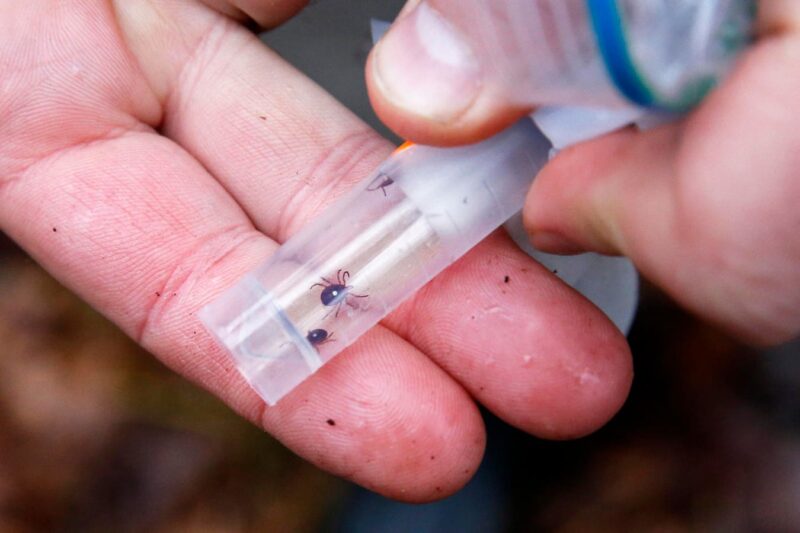The lone star tick, seen here in a vial, can transmit alpha-gal sugar and thus alpha-gal syndrome. (Staff photo by Ben McCanna/Portland Portland Press Herald via Getty Images)
Portland Press Herald via Getty Images
Tick. Tick. Tick. It was only a matter of time before someone died from alpha-gal syndrome that started from a tick bite. After all, the U.S. has a ticking time bomb problem with ticks spreading further and further around the country. And getting alpha-gal syndrome from a tick bite can lead to red meat allergies with reactions ranging from the mild to the intense. Therefore, it shouldn’t be too surprising to see the first reported death—that of a 47-year-old airline pilot from New Jersey as described by a case report in the Journal of Allergy and Clinical Immunology: In Practice.
It Took A While To Diagnose Alpha-Gal Syndrome As The Cause Of Death
The cause of this man’s rather sudden death in September 2024 had been a mystery for a little while. It took some sleuthing and dot-connecting from members of the team that wrote up the case report from the University of Virginia (Thomas A.E. Platts-Mills, MD, PhD, Lisa J. Workman, Nathan E. Richards, MD and Jeffrey M. Wilson, MD, PhD) and Hackensack Meridian Health (Erin M. McFeely, MD). And dot-connecting with ticks can be tough, especially since they can appear like no more than little dots on the skin.
The case report described what happened that fateful day when the man from New Jersey—who had no significant pre-existing medical conditions—passed. He had consumed a hamburger at a barbecue and then began feeling ill around four hours later—not terribly, terribly ill since he still managed to mow his lawn and read a newspaper after he had returned home. However, later that evening, his son found the man unconscious on the bathroom floor surrounded by vomit. A subsequent autopsy revealed no clear cause, leaving everything a mystery.
But a big clue had come two weeks prior. During a camping trip, he and his family had a 10 pm dinner that included steak rather than their typical meat-of-choice: chicken. He subsequently woke up at 2 am with severe diarrhea, vomiting and abdominal pain—to a feel like he was going to die level. However, since the symptoms eventually went away, he and his wife had decided not to contact a doctor.
This history motivated doctors to go back and get a previously drawn sample of the man’s blood tested for the possibility of alpha-gal syndrome. Indeed this look-back blood testing in April 2025 found evidence of a big time anaphylaxis-level allergic reaction. The level of something called tryptase were over 2000 ng/mL, which is among the highest levels that you’ll see. But additionally, the testing found something even more specific, antibodies—specifically immunoglobulin E or IgE—to the sugar alpha-gal. About 3.4% of the IgE found in the man’s blood was against alpha-gal, and any percentage over over 1% is typically a big look-at-this level.
What Is Alpha-Gal Syndrome?
Now, alpha-gal may sound like a female version of an alpha male. But here the “gal” is short for galactose. And alpha-gal is short for a specific type of sugar named galactose-alpha-1,3-galactose. You can usually find such a sugar in all non-primate mammals such as cows, deer, goats and pigs. When ticks suck the blood of such mammals, the alpha-gal can then get into the ticks’ saliva. And guess what can subsequently happen when the ticks bite you? Yep, they can deposit that sugar into your blood where your immune system might view the alpha-gal as some kind previously unrecognized threat and thus generate antibodies against the stuff.
The result can be alpha-gal syndrome and your immune system reacting against anything with alpha-gal in it. You can find alpha-gal in red meat like beef, pork, lamb, venison, goat and rabbit, hence the moniker “red-meat allergy.” But things other than meat can meet the criteria for having alpha-gal in them like dairy products, foods and medications with gelatin since gelatin can consist of stuff like collagen from mammals and medical products like snake anti-venoms and prosthetic heart valves from cows or pigs.
Your immune system reactions can range from the the mild to the very severe whenever exposed to alpha-gal. They can include skin reactions like itchy rashes or hives, gastrointestinal stuff like heartburn, indigestion, nausea, vomiting, abdominal pain, constipation or diarrhea, respiratory problems like a cough, shortness of breath or even difficulty breathing, cardiovascular issues like drops in blood pressure, swelling of different parts of the body and dizziness, light-headedness or loss of consciousness. As was seen in the case study, reactions can in some cases be so severe that they become life-threatening.
The level of IgE in your body can decrease over time. This can mean that the immune reactions can become less and less severe. You may even get to the point where you can consume red meat again with no problems. However, this doesn’t mean that you should haphazardly insert burgers into your diet if you have alpha-gal syndrome and just see what happens. Plus, being bitten again by another tick with alpha-gal in its saliva can get IgE levels back up again.
How Can You Tell If You Have Alpha-Gal Syndrome
One challenge with diagnosing alpha-gal syndrome is that many people may not even be aware of it or what it is—even doctors. For example, a 2023 report in the Centers for Disease Control and Prevention Morbidity and Mortality Weekly Report found that of 1,500 health care professionals surveyed, 42% “were not aware of” alpha-gal syndrome and 35% “were not confident in their ability to diagnose or manage AGS patients.” Therefore, you’ll need to stay aware of any potential allergic reactions you may be having.
Also, stay aware of ticks and tick bites. This can be challenging since ticks can be very small and do not announce themselves when about to suck your blood. In the case of New Jersey man, when docs went back and asked the man’s wife about his history of tick bites, his wife initially replied, “Yes, in the past, but none this year.” However, “On further questioning, she said that earlier in the summer he had 12 or 13 ‘chigger’ bites around his ankles that left pruritic papules. In the eastern United States, what are often called “chiggers” are more often larvae of Amblyomma americanum (ie, Lone Star ticks), which are known to bite humans and are an important cause of sensitization to alpha-gal.”
As alluded to earlier, once alpha-gal syndrome is on the list of possibilities, blood tests can suss out what you may be suss about. These tests can check your blood for antibodies against alpha-gal as wells as particular types of meat like beef or pork.
What Do You Do Once You Have Alpha-Gal Syndrome
Unfortunately, there’s no specific treatment for alpha-gal syndrome. One of the key things then is to avoid anything that may lead to allergic reactions. That means avoiding the red meats and swapping in things with wings and fins like chicken and fish instead when you want to get some type of meat fix. You also may want to avoid things on a dairy basis, so to speak, like milk and ice cream. And be careful about saying hello to Jell-O. Food that consist of gelatin like marshmallows and jellybeans could lead to a reaction. Furthermore, anytime you are about to receive any medical product, make sure that whoever is giving it to you is aware that you have alpha-gal. People with alpha-gal syndrome have had reactions to a range of medical things that have somehow come from cows and other mammals such as heparin, pancreatic enzymes and gelatin-containing stuff like capsules and certain vaccines.
Since alpha-gal syndrome qualifies as an allergy, you should take all the precautions that anyone with a potentially severe allergy might. This means carrying around an Epi-Pen or the equivalent and keeping antihistamines always easy to access. Epinephrine and antihistamines as well as corticosteroids are ways of treating more severe reactions.
Finally, avoid any further tick bites. You probably should never welcome tick bites, especially since different ticks can carry different nasties such as Powassan viruses, Alongshan viruses and the stuff that causes Lyme Disease. But getting bitten again can be a déjà vu all over again situation for anyone who already has alpha-gal because allergic reactions can become that much worse. I’ve already written before in Forbes about how best to keep yourself from ticks.
The Risk Of Alpha-Gal Syndrome Is Growing As The Lone Star Tick Spreads In The U.S.
Avoiding tick bites is also the way to prevent getting alpha-gal syndrome in the first place. But this may be getting harder and harder to do. Both the lone star tick, which is the most common tick carrier of alpha-gal, and white-tailed deer, which is the lone star ticks primary host, have been spreading northward. This seem to be in big part due to that thing called climate change. Climate change has led to warmer winters and thus longer tick seasons.
In fact, Casey Locklear, DVM, a veterinarian and parasiticide lead at Elanco Animal Health, warned that the colder weather these days may lull people into a false sense of security, at least tick-wise, “Folks inherently associate summertime with insects and parasites alike, so they think that summertime equals fleas and ticks.” That means taking tick precautions more year-round. That includes things like keeping your extremities covered—which may not be so hard to do in the colder months—, using insect repellant and checking your body for ticks whenever you are in areas more likely to have ticks such as dense, brushy, heavier vegetation environments.
Locklear also reminded me about those who may poop on your floor. No, not your human roommate but your pet animals. Pets can bring all sorts of things into your domicile including ticks. “With the rise of the Lone Star tick, this means that pet owners must prioritize protection, as dogs are the primary carriers bringing ticks into the home environment for humans,” she urged. “One important treatment to protect your dogs and help prevent both bringing the Lone Star Tick and Alpha-Gal Syndrome directly into your home for humans is to look at treatment options like Credelio Quattro for your dogs.”
Although the exact numbers of alpha-gal syndrome cases around the U.S. over time have not been tracked, a presentation at the American College of Gastroentreology’s 2025 annual scientific meeting did have the E-word in its title, as in “Explosive Rise in Alpha-Gal Syndrome: A Real-World Analysis.” At the meeting held in Phoenix, Arizona, Vinay Jahagirdar, MD, a GI fellow at Virginia Commonwealth University Medical Center, presented on behalf of his VCU Health team result from an analysis of blood sample testing results from the TriNetX US Collaborative Network. The analysis found a hundred-fold increase in the number of positive test results for alpha-gal antibodies between 2013 and 2024. That could qualify as an explosive rise.
Many scientists have been warning about the continued growth of ticks and tick-borne illnesses such as alpha-gal for a while now. But surprise, surprise there hasn’t seemed to be the needed urgency among politicians and policy makers in dealing with these ticking time bombs. The concern is that once again real action won’t be taken until it gets too late.









